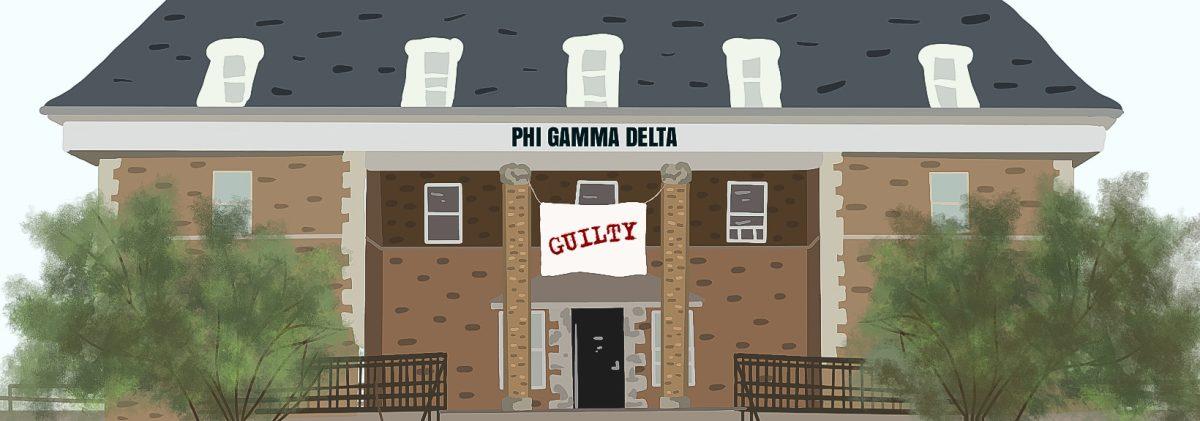
Abigail Ramirez is a freshman journalism major at MU. She is an opinion columnist who writes political and social commentary for The Maneater.
In response to a civil lawsuit filed against them for leaving Daniel Santulli unresponsive due to alcohol poisoning, the national chapter of Phi Gamma Delta claims that the former MU student “acted unreasonably” by voluntarily consuming too much alcohol. The MU and national chapters of the fraternity, commonly known as Fiji, are inextricably in the wrong for trying to blame Santulli for their own mistakes. Victim blaming will not solve the toxic environment in fraternities or properly discipline the members.
The night of the incident, Fiji members were holding their “Pledge Father Reveal,” where pledges find out which older member of the fraternity becomes their mentor figure. That night, pledges, including Santulli, were blindfolded and put in a room where they met their pledge fathers and were told to drink an entire bottle of hard liquor in front of them.
The national chapter does not believe they should be held liable for what they claim are his mistakes because the party was not “an event, occasion or incident planned, controlled, approved by or known to” the national organization.
In the lawsuit, Santulli’s parents claim that Jack O’Neill, the live-in house director of the chapter, was negligent in not reporting the party to MUPD for underage drinking. In response, he argued that the freshman “voluntarily consumed an unreasonably dangerous quantity of alcohol” and “failed to seek assistance.”
However, this event was a tradition in the Fiji house. Pledges were expected — not asked — to follow through with such tasks. Some pledges even had their bottles of alcohol taped to their hands to put on extra pressure to finish it. In addition to this, other drugs such as marijuana and cocaine were rampant at the party.
As an in-house director and former MU staff member, O’Neill’s main responsibility was to protect the men in the house and prioritize their safety. This means protecting freshman pledges from unreasonable hazing by older members, which is something he failed to do.
Regardless of the in-house director’s reluctance to be a mature adult, the toxic environment that fraternity members cultivated is what’s to blame for Santulli’s injuries. Even though hazing is specifically banned at MU, Fiji members followed through with coercing pledge members to drink copious amounts of alcohol at the party.
These types of behaviors reveal the ways in which men link their masculinity to drinking. In a 2012 National Library of Medicine study, researchers found that the inability to consume and hold down large amounts of alcohol was seen as weak, feminine behavior by men. The study also found fraternity members are more likely to consume dangerous amounts of alcohol, and they often use it as a “social lubricant” and associate it with masculine behavior.
While it may seem easy to say no to hazing or irresponsible behavior in any situation, oftentimes it is not that simple. In this case, Santulli was facing emasculation and enormous amounts of peer pressure from his elder fraternity brothers in tandem with feeling the need to impress them to fit in. At this point of the pledge process, “he said that he was exhausted, that he could not take it anymore,” and broke down in front of his sister for the first time in his life.
Knowing this, it’s clear that Santulli felt that he had two options: continue being hazed to fit in or be emasculated and publicly embarrassed by people who are supposed to be his “brothers.” For a college freshman just trying to fit in, there was only one choice.
In the past, other Fiji chapters have been sued for similar events, and initially the national group apologized for their members’ actions and said they “expect all chapters and members to follow the law and abide by the fraternity’s policies, which prohibit hazing and the provision of alcohol to minors.”
By blaming victims and harassing journalists who seek to expose their behaviors for being reckless and malicious, Fiji refuses to accept that the culture they have created is the problem. Their inability to realize they are guilty allows such toxic traditions to continue.
For Santulli and other victims of toxic fraternity culture to receive justice for their injuries, O’Neill, the MU chapter and national chapter of Fiji should be sued for their lack of responsibility and negligence. By making an example out of the fraternity and their members, people can start to reconsider what brotherhood and masculinity in a fraternity means.
Alcoholics Anonymous is a group of people wanting to solve their drinking problems together. No matter your age or story, AA accepts any person wanting to achieve sobriety.
Donate at: https://contribution.aa.org/sca-dev-2020-1/checkout.ssp?is=checkout&lang=en_US#login-register
Edited by Sarah Rubinstein | [email protected]